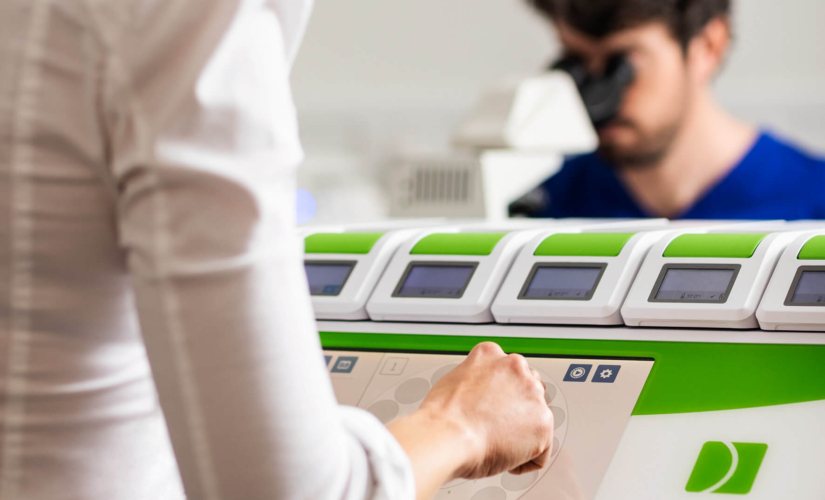The importance of male fertility
Ed Coats, Medical Director of The Evewell West London, talks to us about the importance of male fertility, what can be done to help those suffering with male factor infertility and how to improve your sperm health.
Did you know that male factor infertility is a significant contributor to difficulties in conception?
While women are born with all the eggs they will ever have, the man’s body creates sperm on a daily basis. In fact, 1,500 new sperm cells are “born” every second.
When we discuss fertility, it’s essential to consider both partners. While female fertility often takes the forefront in discussions, male fertility is equally important. In fact, research indicates that 50% of cases involving difficulties conceiving are attributed to male factors.
Unlike female infertility, usually there aren’t many signs of infertility in men, which means very often men can experience issues with their fertility without even knowing. And often this isn’t even identified until a man has been struggling to conceive for some time.
But it takes a sperm AND an egg to create a baby, meaning sperm quality and quantity are vital for successful conception. Factors such as total sperm number, sperm concentration, volume, motility, and morphology all play crucial roles in determining fertility potential, and these are things we always look at in a semen analysis.
Understanding male fertility isn’t just about addressing problems; it’s about empowering individuals and couples to take proactive steps such as lifestyle changes to help them achieve a successful pregnancy.
How do we test for male fertility?
When individuals or couples embark on their fertility journey, one of the initial steps involves comprehensive fertility testing. While female fertility testing (such as the AMH blood test and an ultrasound scan) is often more familiar, male fertility testing is equally essential.
A standard component of male fertility testing is the semen analysis, also known as a sperm test.
This test evaluates various parameters crucial for fertility, including semen volume, total sperm number, sperm concentration, motility, and morphology. Each parameter provides valuable insights into sperm health and fertility potential.
Total sperm number refers to the total count of sperm present in a semen sample. Higher numbers increase the likelihood of successful conception.
Sperm concentration measures the number of sperm per millilitre of semen, providing a critical indicator of fertility.
Volume refers to the amount of fluid produced during ejaculation, necessary for sperm transport and fertilisation.
Motility assesses the sperm’s ability to move effectively, essential for reaching and fertilising the egg.
Lastly, morphology examines the size and shape of sperm, with abnormal morphology potentially indicating fertility issues.
How does what I eat and what I do, affect male fertility
While genetics and medical conditions certainly play a role in fertility, lifestyle choices can also significantly impact sperm health and fertility potential.
But there is good news… the process from germline stem cell to sperm cell takes about 70-80 days, meaning: you can make changes to your diet, and lifestyle, and see results in your sperm after a few months.
Here are some of the things that affect your sperm, and what we recommend doing if you’re looking to conceive in the near future.
- Smoking and vaping have been proven to cause decreased sperm count, motility and morphology. If you do either of these, we recommend cutting them out, immediately.
- Drinking alcohol can lower testosterone levels and cause sperm production to decrease. Think about reducing your alcohol intake, there are some great low or zero alcohol options out there now.
- Certain foods will promote male fertility, and some will have the opposite effect. Fruit, veg, fish and whole grains help improve sperm quality, however, processed meat, caffeine and saturated fats are linked to low sperm quality.
- Recreational drugs like marijuana and cocaine can also negatively affect sperm quality.
- Having a BMI that is classified as being overweight or obese can affect the quality and quantity of sperm.
- Keeping your testicles too warm, sitting down for prolonged periods, using laptops, saunas and hot baths, can reduce sperm quality.
- And wearing tight underwear can reduce sperm count, as it pushes your testicles closer to the body, making them hotter (try boxer shorts instead of pants for a few months).
- Some medications such as antidepressants and steroids can affect ejaculation and thus cause fertility issues. Speak to your GP if you’re concerned any medication you’re taking may be having an effect on your sperm.
- Sexually transmitted diseases such as chlamydia and gonorrhoea can also cause infertility in men. It’s important to be up to date with any testing if you’re trying to conceive.
What are the causes of male infertility?
Male infertility can stem from a variety of causes, ranging from hormonal imbalances to genetic factors and lifestyle choices.
Hormonal imbalances, such as abnormal testosterone levels or thyroid disorders, can disrupt sperm production and fertility. Similarly, genetic factors such as chromosomal abnormalities or mutations can affect sperm quality and fertility potential.
Lifestyle choices, including diet, exercise, smoking, and alcohol consumption, can also impact male fertility. Poor nutrition, excessive alcohol intake, and smoking or vaping can all contribute to decreased sperm quality and fertility (but as sperm is renewed every 60-90 days, you can make significant changes by adapting your diet and lifestyle).
By having a sperm test early in your conception journey, you’ll be able to identify and address the underlying reason as to why you’re struggling to conceive, then take proactive steps towards improving your health or choosing the right treatment plan to increase your chances of conception.
What treatment options are available for male infertility?
While receiving a diagnosis of male infertility can be daunting, there are effective treatments available to help individuals and couples become parents.
One common treatment option for male infertility is ICSI (IVF with intracytoplasmic sperm injection). In this procedure, a single sperm is injected directly into an egg to facilitate fertilisation.
ICSI can be particularly beneficial for individuals with low sperm count or poor sperm motility, or those with partners who have suffered multiple miscarriages.
In cases where lifestyle factors or underlying health conditions contribute to male infertility, lifestyle interventions may be recommended.
Making changes such as improving diet, reducing caffeine intake, reviewing exercise, managing stress, and avoiding harmful substances like smoking, vaping and alcohol can positively impact sperm health and fertility.
For individuals with genetic causes of male infertility, advanced reproductive technologies such as sperm retrieval techniques or donor sperm may be options to consider. These treatments can help bypass genetic barriers to conception and achieve a successful pregnancy.
What supplements help to improve male fertility?
If you’re looking to improve sperm health, Mr Ed Coats, Medical Director of The Evewell West London, recommends taking these supplements to (and we’re quoting Ed here…) “make your swimmers medal winners”!
Omega-3 helps sperm health by enhancing motility, reducing inflammation, providing antioxidant protection, and maintaining hormonal balance.
Selenium is a potent antioxidant to help protect sperm cells from oxidative stress, maintaining sperm motility and morphology, and preserving DNA integrity.
Zinc is essential for maintaining optimal sperm motility (their ability to move), enabling sperm to travel through the female reproductive tract and reach the egg for fertilisation.
Coenzyme Q10 to help support energy production and overall sperm function.
Vitamin B12 plays a role in testosterone production, which is essential for overall male reproductive health. Testosterone stimulates the production of sperm cells in the testes, indirectly contributing to sperm count.
Not just recommended for women trying to conceive, but men need Folate too! Folic acid, as it’s known in supplement form, is needed for the development of red blood cells and DNA production. Folate also plays an important role in cell division.
Speak to one of our team by emailing appointments@evewell.com and take control of your fertility journey, in your own home, with confidence.





